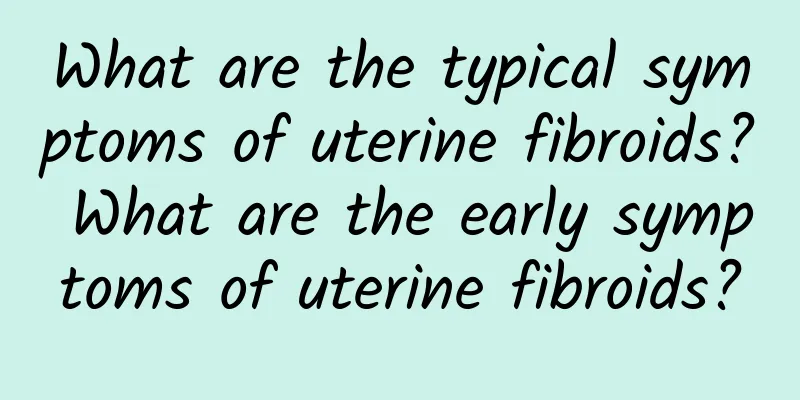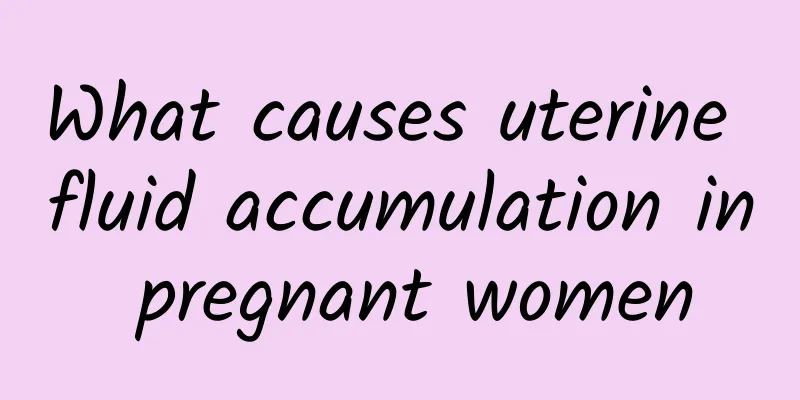What are the typical symptoms of uterine fibroids? What are the early symptoms of uterine fibroids?

|
Uterine fibroids are a common gynecological disease and one of the common causes of female infertility. So, what are the typical symptoms of uterine fibroids? At the same time, it is also important to understand the early symptoms of uterine fibroids so that we can detect the disease as early as possible and take appropriate treatment measures. Typical symptoms of uterine fibroids include: 1. Abnormal menstrual cycle: Uterine fibroids often lead to changes in the menstrual cycle, such as excessive menstruation, shortened menstrual intervals, prolonged menstrual cycles, etc. This may make women feel uncomfortable and have a certain impact on their health. 2. Increased menstrual bleeding: Uterine fibroids can cause increased menstrual bleeding and even prolonged menstruation. This is because the presence of fibroids causes the endometrium to thicken, leading to increased menstrual bleeding. 3. Symptoms of intrauterine compression: Larger uterine fibroids can compress surrounding organs, causing a series of symptoms, such as frequent urination, urgency, pelvic pain, etc. Some fibroids may also compress the intestines, leading to constipation and difficulty in defecation. 4. Enlarged uterus: During the examination, the doctor may find that the patient's uterus is significantly enlarged. This is caused by the growth of fibroids, and as the fibroids grow, the uterus will become harder. In addition to the typical symptoms, uterine fibroids also have some early symptoms, as follows: 1. Abdominal pain and lower abdominal distension: Early uterine fibroids may cause mild abdominal pain and lower abdominal distension. These symptoms are often mistaken for discomfort during menstruation. 2. Abnormal menstrual cycle: In the early stages of uterine fibroids, there may be slight changes in the menstrual cycle, such as early or delayed menstruation. 3. Infertility or multiple miscarriages: Uterine fibroids may cause infertility or multiple miscarriages. This is because the presence of fibroids will interfere with the health of the endometrium, thus affecting the implantation and development of the embryo. Typical symptoms of uterine fibroids are changes in menstrual cycles, increased menstrual bleeding, and symptoms of intrauterine pressure. Early symptoms include abdominal pain and lower abdominal distension, abnormal menstrual cycles, and infertility or multiple miscarriages. If you are experiencing these symptoms, it is recommended to seek medical diagnosis and treatment as soon as possible. Early detection and treatment of uterine fibroids can reduce the impact on fertility and increase the chances of successful treatment. Remember, it is key to maintain regular gynecological examinations, which can help detect and treat any potential gynecological problems, including uterine fibroids. |
<<: What can I eat to get rid of uterine fibroids? What can I eat to get rid of uterine fibroids?
>>: What medicine can control the recurrence of uterine fibroids?
Recommend
The process and steps of medical abortion
Medical abortion is a way to terminate pregnancy ...
The symptoms of vulvar leukoplakia should not be underestimated
Vulvar leukoplakia is one of the diseases that fe...
Is mild adnexitis treatable?
Mild adnexitis can be cured. The key is to detect...
Weight loss star! Eating spinach thylakoids suppresses appetite
Many people have the impression that Popeye the S...
How to scientifically treat patients with cervical condyloma
There are some sexually transmitted diseases that...
Experts explain the symptoms of adnexitis
What are the symptoms of adnexitis? This question...
Vitamin D deficiency not only causes osteoporosis, but also cancer, dementia and 9 other major diseases!
Vitamin D, known as the "sunshine vitamin&qu...
Experts explain physical treatment methods for cervical erosion
Among the various methods of treating cervical er...
Three symptoms of cervicitis that you must know
What are the symptoms of cervicitis? Gynecologica...
Specific causes of cervical hypertrophy
Cervical hypertrophy is an inflammatory change ca...
Patients with cervicitis are likely to have multiple abortions.
Patients with cervicitis are likely to have multi...
What are the diagnostic criteria for uterine fibroids?
Uterine fibroids are a common gynecological disea...
Is a Bartholin's gland cyst contagious?
Are Bartholin's gland cysts contagious? Barth...
Get rid of those annoying elephant legs! Three Medicinal Diets to Reduce Edema
The annoying problems of stress-induced obesity a...
How to recover quickly from threatened abortion
Women of childbearing age will basically delay ch...









